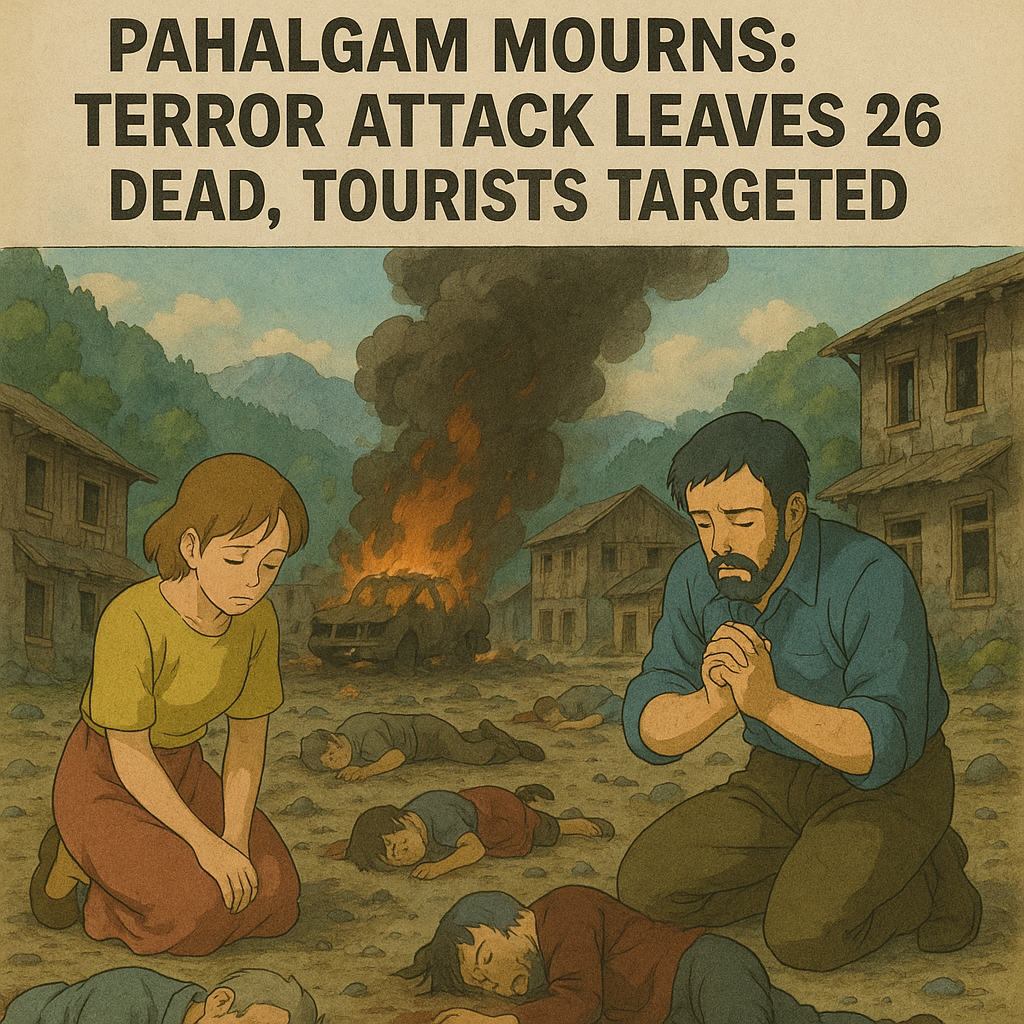Physical Address
18 C Ibbani Harohalli Village
Yelahanka Bengaluru 560064
Physical Address
18 C Ibbani Harohalli Village
Yelahanka Bengaluru 560064

Pahalgam, Jammu and Kashmir, April 23, 2025 – A devastating terrorist attack struck the scenic tourist destination of Pahalgam in Jammu and Kashmir’s Anantnag district on Tuesday, April 22, 2025, leaving at least 26 people dead, mostly tourists, and injuring over 20 others. The attack, described as the deadliest on civilians in the region since the 2019 Pulwama strike, has sent shockwaves across India and drawn international condemnation.
The assault occurred around 2:30 p.m. in Baisaran, a picturesque meadow approximately 5 kilometers from Pahalgam, often referred to as the “Switzerland of India.” According to police reports, two to four gunmen, suspected to be affiliated with The Resistance Front (TRF), a Lashkar-e-Taiba offshoot, opened indiscriminate fire on a group of tourists visiting the area. The victims included 22 Indian tourists from states such as Karnataka, Odisha, Maharashtra, Chhattisgarh, and Gujarat, two foreign nationals from the UAE and Nepal, and two local residents. Among the deceased were an Intelligence Bureau officer from Hyderabad, a businessman from Raipur killed on his wedding anniversary, and a local horse-ride provider, Syed Adil Hussain Shah, who attempted to confront the attackers.
A survivor from Maharashtra recounted the horror to India Today, alleging that the gunmen singled out Hindu tourists, with one militant reportedly sparing a woman, saying, “Go tell this to Modi.” Another witness described running 4 kilometers in panic, stating, “I’m still trembling.” The attack’s scale prompted Jammu and Kashmir Chief Minister Omar Abdullah to call it “much larger than anything we’ve seen directed at civilians in recent years.”
Prime Minister Narendra Modi, who cut short his visit to Saudi Arabia, condemned the attack and assured justice for the victims. Upon returning to Delhi on Wednesday, he met with National Security Advisor Ajit Doval and External Affairs Minister S. Jaishankar to address the crisis. Union Home Minister Amit Shah visited the attack site in Baisaran and met with victims’ families in Srinagar, vowing that “terrorists won’t be spared.” The Jammu and Kashmir government announced an ex-gratia payment of ₹10 lakh for the families of each deceased victim.
The attack has sparked widespread protests, with a bandh called by organizations like the J&K High Court Bar Association and Bajrang Dal, leading to the closure of schools and businesses in Rajouri and Jammu. Candlelight vigils and demonstrations condemning the violence erupted in Baramullah and Srinagar, though local Kashmiris expressed fears of rising anti-Muslim sentiment on social media and national news channels.
Security forces, including the Indian Army and Jammu and Kashmir Police, have launched a joint operation to track down the attackers, though the rugged terrain of Baisaran has complicated efforts. The attack has dealt a severe blow to the region’s tourism industry, with airlines adding extra flights to accommodate tourists fleeing the area and many canceling or deferring trips ahead of the peak season.
International leaders, including U.S. President Donald Trump, Russian President Vladimir Putin, and Israel, expressed solidarity with India. Pakistan extended condolences but distanced itself from the attack, a stance India has linked to groups like Lashkar-e-Taiba operating from its territory.
The incident has reignited debates over security in Jammu and Kashmir, a region plagued by insurgency since 1989. While violence had tapered off in recent years following the 2019 revocation of the region’s special status, this attack marks a rare and brutal targeting of tourists, who had largely been spared in recent decades. As the nation mourns, pressure mounts on the government to implement robust security measures to prevent such tragedies in the future.